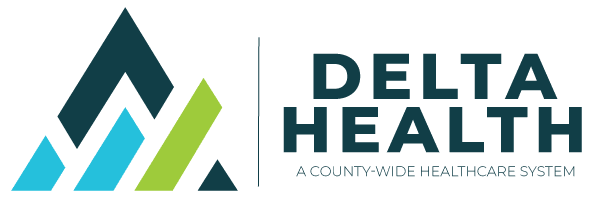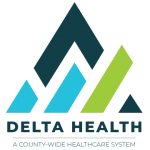The Center for Disease Control and Prevention (CDC) has listed a number of risk factors and the risks associated with these cancers. The following is a list of the most common:
- Alcohol: breast, colorectal, esophagus, head and neck and liver cancers
- Asbestos: larynx, lung ovary and mesothelioma
- Diabetes: bladder, breast, colon, uterus, liver, and pancreas
- Obesity: colorectal, uterine, esophagus, gallbladder, kidney, pancreas and postmenopausal breast cancer
- Sedentary lifestyle: colorectal, uterine, ovary, prostate
- Tobacco use: acute leukemia, bladder, cervical, colorectal esophagus, head and neck, kidney, lung, pancreas, and stomach
- Ultraviolet radiation exposure (sunlight): skin cancers including melanoma
Most of us probably have one or more of these risk factors. This builds the backbone of what we can do to reduce our risk of cancer.
Tobacco cessation:
This is a top priority. For those interested, Delta Health can help! The six-week Tobacco Cessation program is designed to help individuals recognize triggers and to work on ways to get through each situation. Many past participants have been able to set a quit date and successfully quit throughout the class. For information about the next Tobacco Cessation class call Shelly at (970)874-2420.
Reduce alcohol intake:
Heavy drinking is defined as more than 14 drinks /week for men or more than 7 drinks/week for women.
Weight maintenance:
Most adults gain more than 22 pounds once they reach adulthood. Susan Brown, FNP-C, works with patients to manage their diets and specifically manage diabetes.
Increase physical activity:
The American Cancer Society recommends 150 minutes/week of moderate-intensity exercise such as, brisk walking, dancing, yoga, golfing, yard work. Also, reduce the time spent sitting by getting up and moving frequently or take the stairs when you can.
Diet:
Use colorful fruits and vegetables: for example, deep colored greens instead of iceberg lettuce, sweet potatoes in place of white potatoes, berries rather than bananas.
Avoid refined sugars: I do feel that “sugar feeds cancer.”
Eat organic when you can and always try to eat local- an apple from Delta County will beat an apple that had to travel several thousand miles to get to us.
Cut back on portion sizes of red meats- use grass-fed, local if possible. Avoid cured and processed meats.
Sun exposure:
We are very fortunate to have so many sunny days in Delta County. However, the sun exposure brings with it the significant risk of skin cancers, of which melanoma is the most serious.
We need to stress the importance of sunblock, especially with our young children. Sunblock needs to be frequently reapplied.
Stress management:
Stress management is also very important. While stress does not a cause of cancer, it may weaken our immune systems and interfere with our bodies from trying to heal themselves.
Follow Screening Guidelines:
It is very important to keep up with the cancer screening guidelines as recommended by your primary care physicians. Early detection is very important especially in areas of breast, colon, and cervical cancer.
I hope these simple prevention tips are helpful.
– Helen Goldberg, M.D.
Medical Oncology
Integrative Oncology



